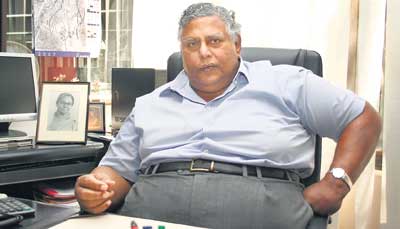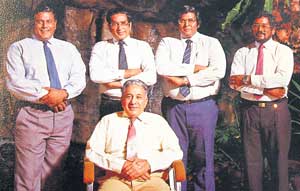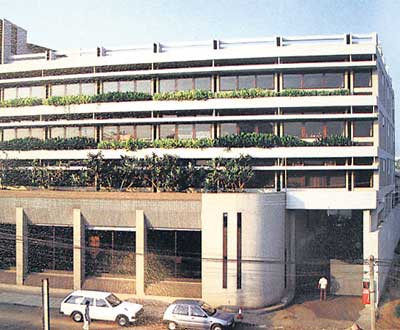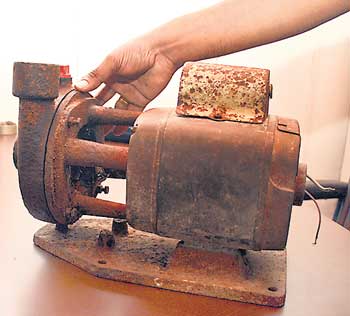
Business with family values
Young Nihal Jinasena didn’t have a choice. The stocky young man – who had just returned from abroad and had got married – was told by his parents to find his own abode. “As a young couple, we decided to try out a small guesthouse at the Ekala factory premises as a temporary home,” Jinasena recalled. Some 30 years later, Nihal and his wife, Sheryll continue to live at the now, spacious Ekala-Jaela bungalow surrounded by stretches of marsh and vegetation, quietness and dozens of birds. “We never felt like moving to Colombo. I love to sit on the balcony with a cup of coffee in the morning and absorb the atmosphere,” noted Nihal, who with his three brothers has taken forward a successful, pioneering manufacturing venture launched by his grandfather, and turned it into a group which has in its ranks the world’s largest solid tyre manufacturer. But the brothers – Nihal, Rohan, Ranjit and Tissa – like their father (Tissaweera) and grandfather, C. Jinasena – have been shy of publicity and not many people knew until recently about the link between the Jinasena Group and Loadstar, the world’s biggest solid tyre maker. Their life and business have been built on four basic principles that came down from their grandfather. Principles
For many, the Jinasena Group is synonimous with the Centric Water Pump – the first ever in the country – and now the most popular, though most expensive, in the market. “We may be expensive but we give a good product and have enough spares.” Some of the first Centric pumps built in the early to mid-1950s are still around and workable, more than half a century later. “Our customers know that spares for Centric pumps are freely available many years after purchase unlike the cheap ones now sold in the market.” But this story is not all about the Jinasena Group and its eldest son, Nihal and their business acumen, entrepreneurship and business drive. It’s also about – as this unique series on entrepreneurs unfolds – family values in business, social responsibility and creating organisations that help society and the country, rather than making profits only. Nihal is a low profile business leader – who recently quit a high level position on a matter of principle, ethics and integrity – and the family business is largely driven by the values taught by their elders over the years. Breakfast brothers
That simple lifestyle which has guided the way the family runs the business also occasionally sees Nihal, a former chairman of the Securities and Exchange Commission and DFCC Bank, prepared to get into the field, clean a drain, start a machine or engage in a run-of-the mill job which a business leader or captain of industry would never do. Which high profile boss would want to dirty his hands in front of a group of workers? “That’s what’s lacking today – leadership,” he laughs. Leading by example is Nihal’s trait. Acknowleding that Sri Lanka has one of the finest human resources, competent and skilled, he says what is standing in the way is the mindset. “Take our graduates. They don’t want to do anything else other than a white collar job,” he says, reflecting on the period when he was growing up, went abroad, got a solid degree in mechanical engineering and returned to his motherland. He is still prepared to roll up his sleeves and sweat it out while being equally comfortable sitting down for a high powered business discussion in an air-conditioned hall. ‘Can do’ attitude The group is now involved in a range of water pumps and generators, ferous and non ferous castings, tractors among other manufactures. But its entry into the solid tyre business changed everything and Loadstar in which Nihal is the chairman, is now bigger than the entire group. Little wonder, given its huge billion rupee turnovers and control of 25 percent of the world market in the product. Makes you wonder why Sri Lankans are fighting each other when together we could make the world take notice of our talents, skills and be wealthy – physically and spiritually!
There was nothing special in Nihal but he learnt his basics from the mother of the nursery movement in the country. His mother knew Lena Wickremaratne, who learnt under Maria Montessori – the founder of the Montessori movement – and that saw Nihal being enrolled in the first batch of students at Wickremaratne’s school. Among them Nirmala de Mel and the Babapulle brothers, as he recalls. “That was a fantastic education (in the 1950s). They taught us Botany, Biology and Maths and when I joined the 5th grade of St. Thomas College, I was far ahead of the others in the class,” he said. ‘Machan’ days It was not an easy life although he was shipped (literally going by ship) to UK to study at the Loughborough College where he graduated in Mechanical Engineering. But Nihal was fun loving and president of the Students’ Union which had far more activity than the unions of Oxford and Cambridge. “It was a huge learning experience. I was a black fellow amongst a whole lot of white fellows. It was a lot of fun – every weekend we went to a ball. My professor called me one day and said I would fail at the rate of my social activity but I vowed to pass and so I did with an Upper 2nd,” he said adding that it was the 4th year sandwich course which included both classroom theory and working in a company. Coming home Reflecting on the theory-practical approach of study, Nihal says today there is a tendency for highly qualified graduates to be churned out of universities who are not only misfits but they think so much of themselves. “Mama upadikaraya (I am now a graduate) … they say not realising that without a skill, they get nowhere.” Often he has sat with other private sector leaders and university authorities to find a solution to the increasing number of graduates who don’t find jobs in the marketplace. “We tell them these graduates are mistfits and explain shortcomings in the system. They say ‘We can’t change our curriculum. You give them the training they need after they graduate’.” Nihal sees a basic problem amongst the rural educated classes. “There is the ‘ugath and nugath’ issue. One passes his AL’s and is kept at home and not allowed to work. The other (nugath fellow), drops out in standard 8 and is sent to work in the paddy field.” He related the case of a tractor driver who said he was a ‘ugath’ worker and refused to lift a mammoty. The same applied to a group of graduates hired by a garment manufacturer as supervisors. Some months later they refused to work with their instructors because they were not graduates! Family bonds with workers “Father brought us up in a simple lifestyle, so it’s not difficult to understand the problems and issues of our employees,” Nihal said, recalling how last week, he discussed a small increment for the workers to combat the ever increasing cost of living. “We realised the difficulties they are going through and rather than waiting for the annual year-end increment, we decided to give them an interim allowance,” he said Nihal’s life has been very colourful, sharing the passion of his father as a champion motor racing driver, winning many awards in Colombo, Nuwara Eliya and India. Sailing was also a passion, a skill he now shares with a group of young villagers in Weligama while nurturing them into a team of yachtsmen to be the best or amongst the best in Sri Lanka. Enjoying the countryside and wild life, Nihal’s weekends are full with visits to holiday homes at Weligama, Bolgoda or his tea estate right on top of a mountain in Kurunegala, 2,000 feet above sea level! Where will Sri Lanka be in the next 20 years? “Difficult to say as it depends on the war. But if the conflict ends today, the country will zoom ahead.” The Jinasena chief is however concerned about the attitude of the public servants and rampant bribery and corruption and believes that’s a major deterrent to growth. |
|
||
| || Front
Page | News
| Editorial
| Columns
| Sports
| Plus
| Financial
Times | International
| Mirror
| TV
Times | Funday Times || |
| |
Reproduction of articles permitted when used without any alterations to contents and the source. |
© Copyright
2007 | Wijeya
Newspapers Ltd.Colombo. Sri Lanka. All Rights Reserved. |



